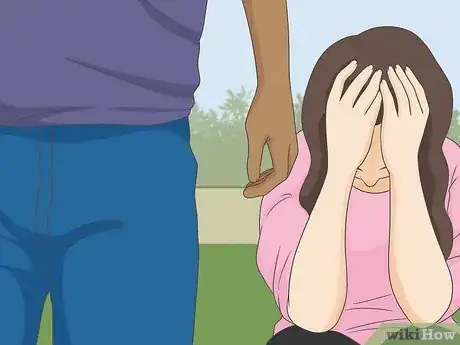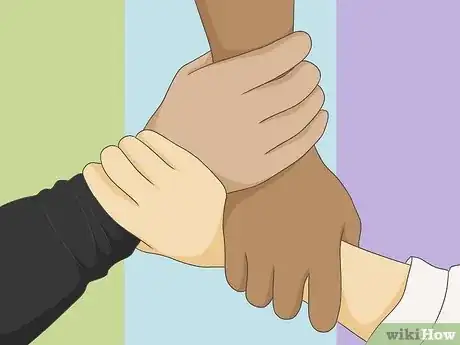This article was co-authored by Lauren Urban, LCSW. Lauren Urban is a licensed psychotherapist in Brooklyn, New York, with over 13 years of therapy experience working with children, families, couples, and individuals. She received her Masters in Social Work from Hunter College in 2006, and specializes in working with the LGBTQIA community and with clients in recovery or considering recovery for drug and alcohol use.
There are 8 references cited in this article, which can be found at the bottom of the page.
This article has been viewed 26,857 times.
Being in a relationship that is devoid of emotional support is difficult. The person who doesn’t receive what they need often feels isolated, rejected, and unloved. It’s easy to pinpoint the problem when you are the victim, but what if you are the withholder? Can you possibly stop this behavior and give your partner what they need? Although it will take some work, it is possible when you understand how you are withholding and why you do so, and then take the steps you need to stop.
Steps
Determining How and Why You Withhold
-
1Understand emotional detachment. There are two big reasons people detach emotionally. One is that you have trouble connecting with others on an emotional level. The other is that detaching emotionally can provide a sense of control in your relationship with others. Spend some time thinking about why you detach from your partner.
- Making a list of reasons you detach can help you understand why you do it.
-
2Ask yourself if you are giving the silent treatment. Do you refuse to talk to your partner or answer questions as minimally as possible? Do you barely acknowledge your partner’s existence or avoid making eye contact? If so, you are likely giving them the silent treatment, which is a form of emotional withholding.
- The silent treatment is considered to be emotional manipulation and can have damaging and long-lasting effects on a relationship. It is intended to inflict pain on a person and is often even seen as a form of abuse.[1]
Advertisement -
3Pay attention to whether or not you withhold affection or support. It’s understandable to abstain from affection during arguments, but if you constantly deny your partner physical love, you are likely withholding.
- Not only does this make your partner feel unworthy of your love, but it’s a quick way for them to look elsewhere to fulfill the physical aspects of your relationship that you aren’t providing. Not providing emotional support for your partner is also an easy way to make them feel unwanted and unappreciated, which can lead to a relationship’s demise.[2]
-
4Notice whether you spend more time with other people. Choosing others to spend your time with instead of your partner is a form of withholding. By being absent, you aren’t providing your significant other with what they need, both physically and emotionally. They will resent you over time, and may cheat on you or leave the relationship because of it.[3]
-
5Ask yourself if you feel vulnerable. Taking the plunge and giving your all in a relationship evokes a bit of fear in just about everyone. However, if you are afraid to give someone everything because you are vulnerable, you are likely only setting yourself up for disaster.
- By not providing the emotional support they need, you will likely make them leave, which you may have prevented if you weren’t afraid of being left vulnerable.[4]
-
6Examine if past relationships have caused your issues. Have you been hurt in relationships so many times you’ve decided that putting yourself out there just isn’t worth it anymore? Were you told that you were unlovable and refuse to believe that anyone could? If so, these scars may be the source of your inability to give yourself emotionally to anyone.
- Oftentimes, the situations people experience as children affect their relationships. People often repeat what they were taught. For example, if your parents gave you the silent treatment when they were angry, you may do the same, and may not even realize you are doing it.[5]
-
7Question if love will make you forget who you are. Independent people may feel like they will lose themselves if they give their all to a relationship. Instead of doing the activities you normally enjoy, you may find yourself engaging in more of what your partner wants to do. This could be a point of contention, making you check out of the relationship.
- Rather than spending time with your friends, you may hang out more with your partner. You may also think constantly about your partner, which opens you up to vulnerability. All of these behaviors can make you feel like your identity has been lost, which can be quite frightening.[6]
Working Together with Your Partner
-
1Talk to your partner. Being open and honest with your partner about your reasons for emotionally withholding can make them understand what is going on. Doing so will likely strengthen the relationship because they no longer have to wonder what the problem is. Telling your partner the problem can help you find a solution together.
- You can start the conversation by saying, “I really care about you and I realize that I may not be showing you the way you need to be shown. I struggle with putting my emotions out there, but I would like to make this work with you.” Tell your partner that you want to try and work on ways you can do it together.[7]
-
2Tackle unrealistic fears. One way to overcome emotional withholding is to consider "What's the worst that can happen?". Often, partners withhold because of fear. They fear being judged, ridiculed, misunderstood, or rejected by their partners. As a result, desires, opinions, and emotions are kept inside and locked away with a key. However, all this repression does is create a gaping chasm between you and your partner.
- Make a list of some of your biggest worries relating to expressing and sharing your emotions. Then, write out the worst possible outcome if you did express and share. Perhaps realizing that none of these outcomes are life-or-death or all that serious can help you feel more comfortable sharing.
- For instance, you might fear that telling your partner how much you really care about them puts you at a disadvantage. They can use your love against you, or worse, leave you in spite of your feelings. However, another possible outcome is that the relationship ends or something tragic happens to your partner and they never really knew your true feelings. Which alternative feels worse to you?
-
3Make gradual steps towards being more vulnerable. Many people fear vulnerability. Yet, when you recognize what's on the other side of vulnerability, it becomes more appealing. When you are vulnerable you are truly alive. It's what being human is all about. Take baby steps to prove the truth of this.[8]
- Leave a little note in your partner's lunch or in a pocket for them to find. You don't have to express your deepest feelings, but share something a bit more revealing than usual. You might simply write, "I can't wait to see you this evening" when you usually don't show much excitement regarding your partner's presence. Wait and see how they react to this. More than likely, they will be pleased. And, so will you. Being vulnerable feels good.
- Once you complete a small step like this, move on to taking more and more acts of vulnerability until you slowly feel more comfortable being open and expressive.
-
4Ask your partner to exercise patience. If your partner gives you more love and affection than you are able to return at the moment, ask them to ease up until you are able to return the favor. This doesn't mean telling them to stop loving you, but it may mean requesting that they match your affection for a time until you feel more comfortable. This helps create a balanced give-and-take in the relationship and prevents either partner from becoming resentful.[9]
Getting Outside Help
-
1Talk to a professional. If you’re unable to get to the bottom of your withholding, or simply can’t get past it, talk to a therapist or counselor about what you are going through. Your therapist may help you realize something you are unable to alone, and give you exercises that help you achieve your goal. Consider taking your partner with you to also give insight on how you display this behavior.[10]
- It may be worth trying emotionally focused therapy, which addresses how couples interact with one another in a relationship. This therapy can increase emotional expression and discussion during times of conflict.
-
2Consider your treatment options. In order to heal and make strides in emotional sharing, you will need to address the damage or trauma you experienced in the past that developed these patterns. Talk to your therapist or doctor to see if any of these treatments are a good option for you:[11]
- Somatic experiencing is one kind of treatment in which you focus on your bodily sensations to release any repressed emotion or tension relating to a traumatic experience.
- Cognitive behavioral therapy is an extremely effective form of psychotherapy geared towards identifying negative and unhelpful thought patterns and challenging these thoughts to build healthier, positive mindsets.
- Eye movement desensitization and reprocessing is a behavioral technique that helps relieve the distress of traumatic experiences with rhythmic eye movements.
-
3Participate in a support group. You may find that a support group provides you with the help you need to move past your problems. Sometimes it’s helpful to hear from others who are experiencing the same troubles you are, as you can learn how they combat what is going on with them. Talk to your therapist about support groups near you, or join an online support group if you can’t find one.[12]
Expert Q&A
-
QuestionWhy do people emotionally stray in relationships?
 Lauren Urban, LCSWLauren Urban is a licensed psychotherapist in Brooklyn, New York, with over 13 years of therapy experience working with children, families, couples, and individuals. She received her Masters in Social Work from Hunter College in 2006, and specializes in working with the LGBTQIA community and with clients in recovery or considering recovery for drug and alcohol use.
Lauren Urban, LCSWLauren Urban is a licensed psychotherapist in Brooklyn, New York, with over 13 years of therapy experience working with children, families, couples, and individuals. She received her Masters in Social Work from Hunter College in 2006, and specializes in working with the LGBTQIA community and with clients in recovery or considering recovery for drug and alcohol use.
Licensed Psychotherapist I think that happens often when people’s needs aren’t being met, particularly needs of emotional support. It happens when people feel that their partner isn't there for them, whether that be actually physically or geographically speaking, or whether it's emotionally speaking.
I think that happens often when people’s needs aren’t being met, particularly needs of emotional support. It happens when people feel that their partner isn't there for them, whether that be actually physically or geographically speaking, or whether it's emotionally speaking.
References
- ↑ http://www.couplescounselingchicago.net/the-silent-treatment-and-8-forms-of-emotional-manipulation/
- ↑ http://www.focusonthefamily.com/lifechallenges/abuse-and-addiction/understanding-emotional-abuse/faqs-about-emotional-abuse
- ↑ http://verbalabusejournals.com/about-abuse/what-is-verbal-abuse/types-of-verbal-abuse/deprivation-withholding/
- ↑ http://www.psychalive.org/why-people-respond-negatively-to-being-loved/
- ↑ https://www.psychologytoday.com/blog/rediscovering-love/201601/are-you-withholding-love
- ↑ http://www.psychalive.org/why-people-respond-negatively-to-being-loved/
- ↑ http://www.cognitivehealing.com/depression/learn-how-to-identify-and-express-your-feelings/
- ↑ https://www.psychologytoday.com/blog/rediscovering-love/201601/are-you-withholding-love
- ↑ https://www.psychologytoday.com/blog/rediscovering-love/201601/are-you-withholding-love
- ↑ http://blogs.psychcentral.com/relationships/2014/02/the-effects-of-withdrawal-or-withholding-emotion-on-your-couple-relationship/
- ↑ http://www.helpguide.org/articles/ptsd-trauma/emotional-and-psychological-trauma.htm
- ↑ http://www.cognitivehealing.com/depression/learn-how-to-identify-and-express-your-feelings/









































































